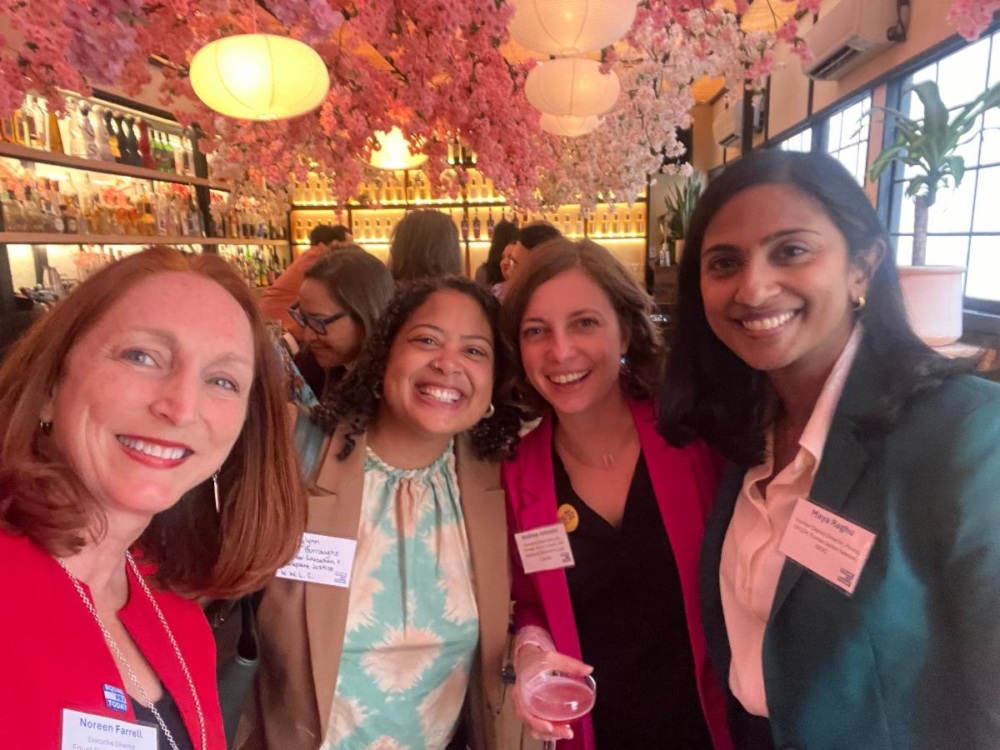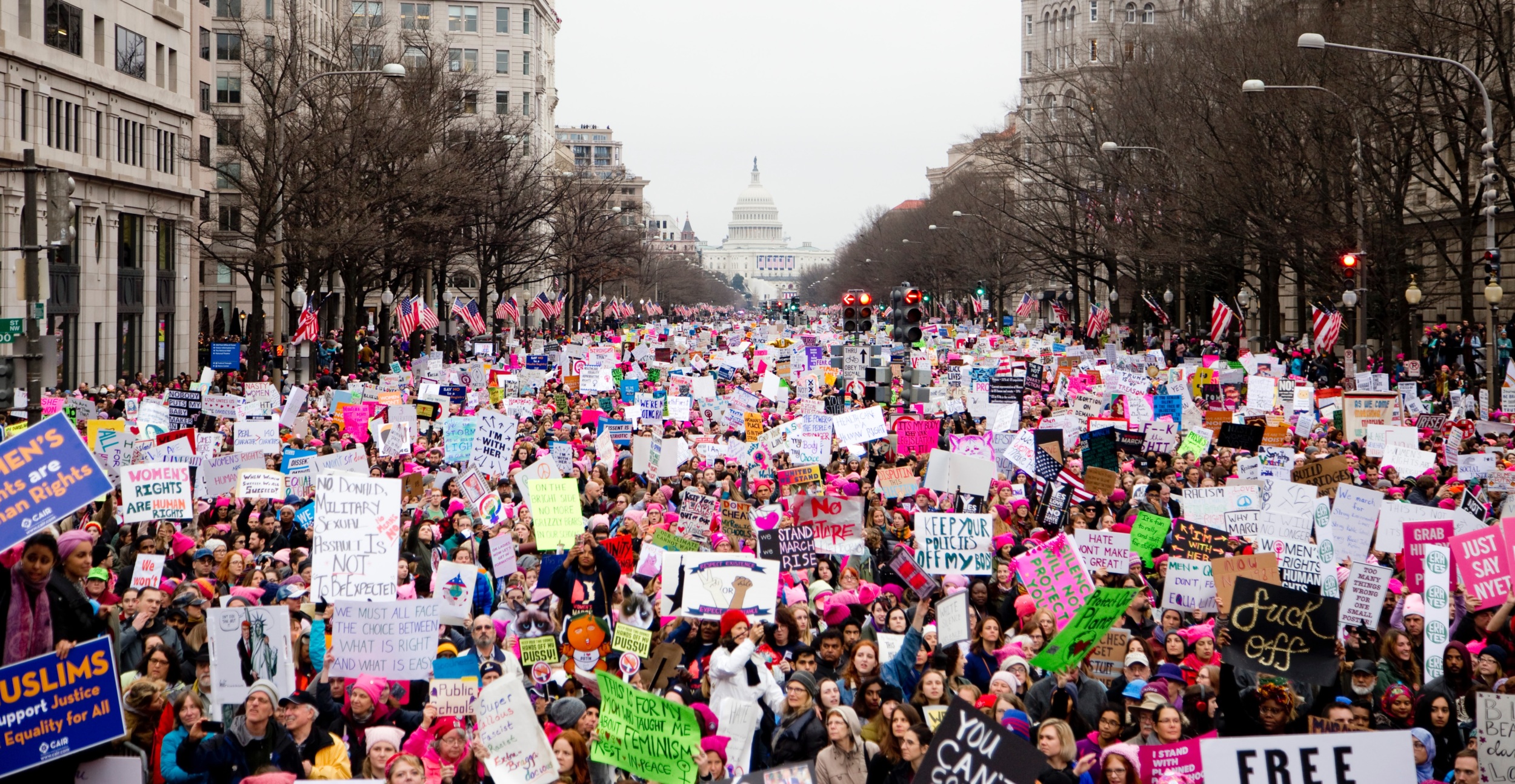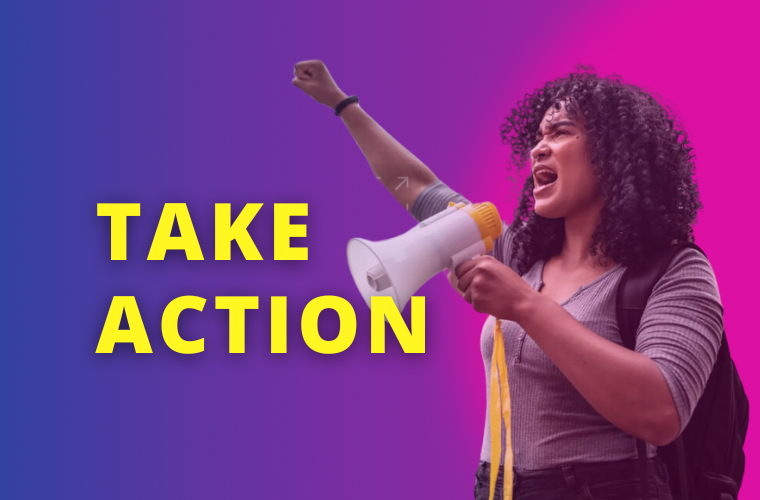

Women’s March Series: Should I ‘Cancel’ the Women’s March?
The Women’s March Series
Equal Rights Advocates is among the thousands of organizations and millions of people who have joined three Women’s Marches since 2017. Many of us share a common belief that freedom and equality belong to all of us. Many of us call for change to reach both. But each of us march (or don’t march) for different reasons. Each of us experience oppression, exploitation and fear as differently as we experience joy, abundance and safety.
As the Women’s March approaches its fourth year, we have observed what happens when some people who have designated themselves as Women’s March leaders try to speak for all of us. At Equal Rights Advocates, we reject this effort. The beauty of the Women’s March is inclusion as defined by each person who steps alongside us, even if there is disagreement among us. Equal Rights Advocates does not toe an organizational line when it comes to the Women’s March. We encourage every staff member to express their views. We publish a few here. They are beautiful, fierce, and independent. This is our movement, and we are proud of it.
– Noreen Farrell, Executive Director
———
By Mei Mei Chan, Finance Assistant
The feminist community is not fragile. We can talk about difficult things together.
Should I RSVP in the negative to the Women’s March?
You may wonder, how could I even consider the possibility of not going to the Women’s March? It’s the Women’s March! Since fall 2016, this has been the single biggest event in the U.S. uniting women and progressives on a single front against the 45th presidential administration (watching U.S. Women’s Soccer may be a close second).
As a staff member at a feminist organization, I know the implications of the priceless hype around this day, the humongous crowds of people we can connect with, the opportunities. The opportunities!
But other people before me have canceled the Women’s March. They’re not even Trump supporters, either. People who used to be a part of the Women’s March at some point decided to leave. Our very own people have quietly (or not so quietly) RSVP’d in the negative.
At present, we must admit that the Women’s March chooses to sustain itself by flattening a widely diverse progressive movement into a specific narrative of feminism that centers white, cisgender, and elitist issues.
In 2018, S.T. Holloway wrote a piece for the Huffington Post titled, “Why This Black Girl Will Not Be Returning To The Women’s March,” explaining that she would no longer attend because it became clear to her that the constituents of the Women’s March did not actively support black women’s political issues, such as rampant police brutality in black communities, the unconscionably high black maternal death rate, and more. Holloway ends her piece with a very damning statement, “Until OUR issues become all of our issues, I cannot continue to lend my voice, my strength and my power to a movement or a brand of feminism that seeks to end the oppression of some of its members, while some of its members continue to aid in the oppression of others.”
Even as early as fall 2016, Rosie Campos explained her resignation from her role as a local Women’s March organizer in her Medium article, “Dear White Women: This is not about us,” where she reflects on the criticisms of the Women’s March as culturally appropriative and racist.
When we engage ourselves with another person or movement, the public often perceives our engagement to mean a co-signing of what they have said or done. Cancel culture dictates that if we don’t wish to appear as if we endorse what someone else has done or said, then we could dissociate ourselves from them. We cancel them and withdraw our endorsement of their continued influence and power.
When the Women’s March ousted Muslim-American activist Zahra Billoo in September 2019 from their Board of Directors, the Women’s March was undergoing a barrage of criticisms for alleged anti-semitism among the organization’s leadership. Tweets by Zahra Billoo surfaced within hours of the announcement of her inclusion on the new board of directors, and people zeroed in on her criticisms of Israel’s treatment of Palestine.
Afraid that choosing to keep Zahra Billoo on the board would make them appear to engage with anti-semitism, the leaders gave her a message along the lines of: “The organization is too fragile to handle this.” The leaders of the Women’s March were afraid of being canceled because of their association with her. So instead, they canceled Zahra Billoo.
In her interview with Haute Hijab, Zahra Billoo asked, “What is fragility, and what does it look like that we want to work together … but the moment you are attacked for something like this, you are cast aside?”
Rather than remain engaged with each other and work together to confront our true adversaries, casting people out of our own communities alienates ourselves from each other.
What does it look like when we cancel each other? What does it look like when we cast each other aside?
According to their website, the Women’s March National declares that their mission is “to harness the political power of diverse women and their communities to create transformative social change.” Was their decision to oust Zahra Billoo in line with who they say they are?
For many people, the fact that the Women’s March has made so many decisions in conflict with their mission is good enough reason to cancel them. There are so many reasons for us to consider canceling the Women’s March, to withdraw our endorsement of their power and influence.
At present, we must admit that the Women’s March chooses to sustain itself by flattening a widely diverse progressive movement into a specific narrative of feminism that centers white, cisgender, and elitist issues.
Here is a short list of perspectives that the Women’s March has been actively or implicitly excluding and why it’s so problematic:
Excluding women of color.
- The Women’s March’s appropriation of African-American women’s activism and contribution to the erasure of the black community’s political issues.
- The Women’s March’s clear reluctance to declare an anti-Zionist position by distancing from organizers who choose to take a clear anti-Zionist position. What is possibly more in line with feminism than speaking up for the lives of Palestinian women and families? Anti-Zionism and anti-semitism are not the same thing. Peter Beinart does a great job of ironing out the critical differences in his piece “Debunking the myth that anti-Zionism is antisemitic.”
Excluding transgender and gender-nonconforming people.
- The prevalent emphasis of the cis-heteronormative pink beanie hats and lack of active inclusion of transgender and gender nonconforming people.
Excluding people from working class communities.
- The Women’s March’s inability to be critical of Hillary Clinton’s 2016 presidential campaign as one that failed to properly stand up for women and families in ALL of our communities, and their subsequent lack of interrogation of first inviting her greatest challenger to the democratic primary to headline an event and then dis-inviting him.
It does not have to be this way.
Recently I watched a YouTube video titled “Canceling,” by progressive thinker, activist, and video essayist Natalie Wynn, better known by her YouTube handle Contrapoints. In her video, Natalie Wynn explains that when we cancel people in our own communities, we do ourselves a great disservice. Rather than remain engaged with each other and work together to confront our true adversaries, casting people out of our own communities alienates ourselves from each other.
I believe that many of the leaders and constituents of the Women’s March made mistakes. But we can change.
The feminist community is not fragile. We can talk about difficult things together.
Today, I’m not casting aside the Women’s March. I hope that in the future the Women’s March won’t cast me aside, either.
———-
This piece is part of a series by Equal Rights Advocates staff about personal decisions whether to participate in Women’s March 2020. Read Deputy Director Delia Coleman’s perspective, and Executive Director Noreen Farrell’s perspective.
Recommended reading, also linked above:
- “Dear White Women: This is not about us.” by Rosie Campos in Medium on 21 November 2016
- “Why This Black Girl Will Not Be Returning To The Women’s March“ by S.T. Holloway in Huffington Post on 19 January 2018.
- “Women’s March accused of Islamophobia as CAIR’s Zahra Billoo is forced out” by Azad Essa in Middle East Eye on 19 September 2019
- “In Her Own Words – An Interview with Ousted Women’s March Board Member Zahra Billoo” by Dilshad Ali in Haute Hijab on 30 September 2019
- Tweet commenting the appropriation on the original proposed name for the Women’s March by @NyashaJunior on Twitter on 12 November 2016
- “Tamika Mallory and Linda Sarsour out at Women’s March following allegations of anti-Semitism” by Matthew Rozsa in Salon on 17 September 2019
- “Can You Be a Zionist Feminist? Linda Sarsour Says No” by Collier Meyerson inThe Nation on 13 March 2017
- “Debunking the myth that anti-Zionism is antisemitic” by Peter Beinart in The Guardian on 7 March 2019
- “Why the Women’s March Needs to Be More Trans-Inclusive” by Devin-Norelle on Them. on 19 January 2018
- “At the 2019 Women’s March, I Heard Someone Laugh at a Trans Girl Like Me” by Lucy Diavolo on Teen Vogue on 25 January 2019
- “Elite, White Feminism Gave Us Trump: It Needs to Die” by Liza Featherstone on VersoBooks on 12 November 2016
- Tweet thread response to backlash for inviting Bernie Sanders to Women’s Convention by @womensmarch on Twitter on 14 October 2017
- “Canceling,” by user Natalie Wynn AKA Contrapoints on YouTube on 2 January 2020.
Stay Connected & Take Action
- Get the Latest News & Information Sign up for Email Updates
- Sign Up for Action Alerts Join the Action Team
- Follow Us


